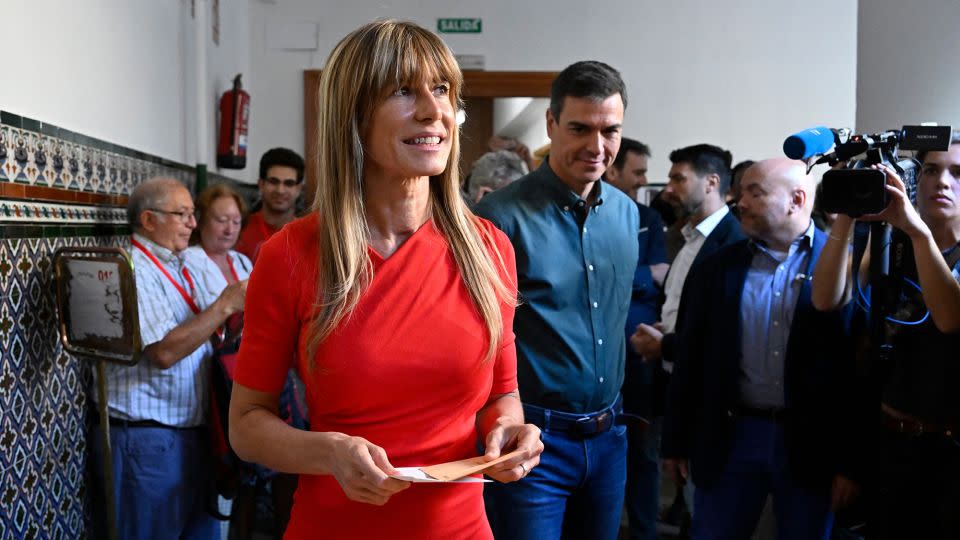Spain’s PM Pedro Sanchez refuses to quit, vowing to fight ‘unfounded’ attack on his wife
Spanish Prime Minister Pedro Sanchez said Monday he will not resign, five days after canceling his public duties to “reflect” on whether to continue in the job, on the heels of a Spanish court opening a probe against his wife, Begoña Gomez.
Sanchez, a socialist, made the announcement in a TV address from his official compound in Madrid, following a corruption complaint against Gomez brought by Manos Limpias (Clean Hands), an organization with links to the far-right.
“I have decided to continue, with more force if possible, as the head of the Spanish government,” the 52-year-old prime minister said.
Sanchez said he would step up his fight against “unfounded” attacks, such as the one against his wife, which he has previously blamed on conservative and far-right forces.
“I act on clear conviction. Or we say enough of this degradation or it will condemn us as a nation,” he said Monday. “This is not an ideological question. It’s a question of dignity and defines us as a society.
“My wife and I know this campaign (against us) will not stop,” and he said it’s been ongoing for 10 years.
Sanchez thanked his Spanish Socialist Party members for their support.
The prime minister’s decision on Monday came after the Madrid regional Superior Court of Justice launched a probe against Gomez “for alleged influence peddling and business corruption” after receiving the complaint from Manos Limpias.
News of the probe surfaced on April 24, and Sanchez announced that he had suspended his public duties until Monday in order to “stop and reflect” on “if I should continue leading the government.”
The prime minister said in a post on X that the Clean Hands complaint appeared to be based on “alleged information” published by what he termed some “right and far-right” digital media.
On April 25, prosecutors presented an appeal to the judge against the probe and asked him to shelve the case, according to the Spanish Attorney General’s press office.
Manos Limpias acknowledged on the same day that it had relied on press reports for its court complaint. “It will be up to the judge to determine if that journalistic information is true or not,” the group said in a statement.
Then a Spanish prosecution service source told CNN that prosecutors did not find indications of a crime that would justify opening a probe against Gomez.
On Friday, another group linked to conservative causes, Hazte Oir (Make Yourself Heard) made public its own complaint to the same court against Gomez, listing only alleged “influence peddling” against her.

Sanchez’ Socialist party performed strongly in recent regional elections in Spain’s northern Basque region. Polling also predicts that the party will do well in regional elections in Catalonia in next month.
Salvador Illa, who was health minister under Sanchez during the Covid pandemic and now is the Socialist Party candidate running for president of the Catalan region, said on X that the prime minister’s decision to remain is “a brave decision to recover the dignity of politics and a commitment to stop those who try to undermine our democracy.”
Meanwhile, the main conservative opposition Popular Party leader, Alberto Nuñez Feijoo, said: “This crisis didn’t start last Wednesday nor does it end today. This is part of various years of embarrassment. Above all, the months of this current legislature, which has been backsliding in stability.”
Sanchez became prime minister in 2018 after winning a no-confidence vote against the conservative Mariano Rajoy.
He won a general election in November 2019, but fell short of a majority. He formed a coalition government with the leftist Podemos party but called snap elections in May 2023 after his party suffered major setbacks in regional and local elections.
Sanchez managed to form a new coalition with a narrow parliamentary majority and was sworn in for a four-year term in November 2023.
Sanchez’s government has been a staunch ally of Ukraine, sending tanks, air defense systems and other aid to Kyiv.
At home, his government has implemented a progressive agenda, including policies on women’s rights and a euthanasia law. These reforms won votes in urban areas, but the pace of change has also led to a backlash in other parts of Spain, as has his openness to working with separatist parties as worries over the breakup of the country.
According to government estimates, some 12,500 people filled the narrow streets around the Socialist Party headquarters in Madrid on Saturday to call on Sanchez to stay. Another 5,000 supporters rallied at the Spanish parliament on Sunday, the government said.
Despite a rainy start to Saturday’s proceedings, huge crowds turned out and chants of “Pedro, stay in office” and “Pedro, we do support you” could be heard amid enthusiastic cheering from the huge crowds.
“If he quits, democracy loses. If he resigns, everything we have fought for goes away – not just the social advances we’ve achieved in this country and the advances for the LGBTI community and for all groups with needs that have problems. No, democracy in general loses,” one demonstrator told CNN en Español.
CNN en Español’s Pau Mosquera contributed reporting.
For more CNN news and newsletters create an account at CNN.com
